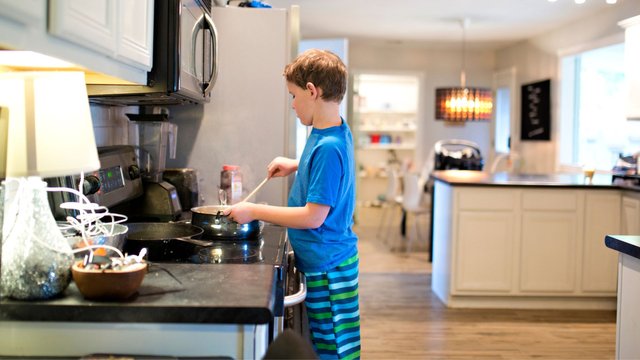Raising Confident Kids: The Permissive Parenting Way

As a mom, my ultimate goal is to raise exceptional, fearless, and purpose-driven offspring. I've come to recognize that no one parenting style that fits all families. It's possible that what works for one family won't for another.
But liberal parenting has helped my kids build confidence and self-esteem.
I'd like to share my knowledge about permissive parenting, including its advantages, difficulties, and helpful implementation advice. I pray that you, a new or seasoned parent, may gain helpful knowledge and be inspired by what you read here.
What Is Permissive Parenting?

A parenting approach known as permissive parenting emphasizes warmth and responsiveness more than rigidity and control. This means permissive parents are more lenient and indulgent with their children, often allowing them to make decisions and set rules.
Here are some of the critical characteristics of permissive parenting:
• Emotional warmth and support: Permissive parents tend to be very loving and nurturing with their children, offering them affection and positive reinforcement.
• Low demands and expectations: Permissive parents do not place many demands or expectations on their children and may avoid setting firm rules or enforcing consequences for misbehavior.
• Non-interference with child's activities: Permissive parents allow their children to engage in activities that interest them without intervening, even if they may be risky or dangerous.
Many parents are succeeding with a more permissive approach, but certain misconceptions about it must be cleared up. For example, some believe permissive parenting means being a pushover or letting your child do whatever they want.
In reality, permissive parents still set limits and boundaries, but they do so more flexibly and open-mindedly. Others might believe that lax parenting breeds entitled or spoilt kids, but studies have proven this is not always true.
In fact, permissive parenting can actually foster greater self-esteem and independence in children when done correctly.
Finding the ideal harmony between warmth and rigidity and personalizing your approach to match the needs and personalities of each child is ultimately what makes permissive parenting successful.
How Permissive Parenting Builds Confidence

Permissive parenting's capacity to increase children's assurance and sense of worth is crucial.
Parents who let their kids do anything they want create a safe and nurturing environment. This enables youngsters to choose and express themselves, helping them discover what they like and gain independence.
Here are some of how permissive parenting can build confidence in children:
Encourages Independence and Self-expression
Permissive parents let their kids explore their interests and express themselves in their own ways. Kids can gain a sense of autonomy and independence from doing this.
Confidence and assurance flourish when kids can make decisions and own up to the consequences.
Fosters Positive Self-image and Self-esteem
Permissive parents offer their children lots of love, acceptance, and praise, which can help reinforce positive self-images and bolster self-esteem.
Appreciated and welcomed kids tend to believe in their abilities and bounce back from failures.
Creates Trust and Open Communication
Permissive parenting is characterized by open communication and trust between parents and children. By listening to their kids' thoughts and feelings without passing judgment, permissive parents give their kids a safe place to express themselves and learn to trust them.
Children who confide in and trust their parents feel safer in their own lives and interpersonal bonds.
Overall, liberal parenting can effectively boost children's self-esteem and assist in their transition into mature, autonomous adults. It's important to remember that permissive parenting doesn't entail a complete lack of limits and guidelines. Instead, it involves balancing freedom and structure and creating a supportive and loving environment where children can thrive.
What Is The Role of Boundaries and Consequences in Permissive Parenting?

Permissive parenting is loving and supportive but does not mean no rules or consequences.
In fact, boundaries and consequences are essential components of permissive parenting, as they provide children with structure and guidance while allowing them to explore their independence.
Here are some of how boundaries and consequences play a role in permissive parenting:
Setting Flexible Rules
Although permissive parents may set restrictions and limits for their kids, they are frequently more adaptable and understanding than parents who adopt other parenting philosophies. A permissive parent may let their child stay up late on the weekends or pick their extracurricular activities, but they will still enforce ground rules like politeness.
Providing Natural Consequences
Permissive parents may allow their children to experience natural consequences for their actions rather than imposing punishments or harsh discipline. For instance, a permissive parent can let a child experience the natural consequence of having to work more to better their grades in the future if the child decides not to study for a test and obtains a poor grade.
Encouraging Problem-Solving
Permissive parents often encourage their children to solve problems independently rather than intervening and solving the problem for them. Through this method, kids can learn how to solve problems and gain confidence in handling challenging circumstances.
While permissive parenting is characterized by a more flexible and open approach to rules and consequences, boundaries and consequences are still essential to this parenting style. Permissive parents can support their kids' growth into self-assured, confident adults prepared to face the problems of the world by giving them structure and supervision while also letting them explore their independence.
How To Overcome Challenges with Permissive Parenting

Although it can be very efficient, permissive parenting has difficulties. The most frequent difficulties permissive parents may experience are listed below, along with advice for resolving them.
Difficulty enforcing boundaries: One of the biggest challenges of permissive parenting is enforcing boundaries and rules. Establishing clear rules and punishments that are regularly implemented with permissive parents might be challenging since they frequently exhibit greater flexibility and open-mindedness.
To overcome this challenge, permissive parents can work to establish clear rules and consequences that are fair and appropriate and communicate these expectations to their children calmly and respectfully.
Fear of Being Too Permissive
Some permissive parents may be concerned that they are being too kind to their kids and that this attitude will have adverse effects like poor academic achievement or behavioral issues. Permissive parents may find it beneficial to remind themselves of the advantages of their parenting approach and to concentrate on developing strong bonds with their kids based on emotional support, openness, and trust to overcome this worry.
Balancing Freedom and Responsibility
Permissive parenting involves balancing allowing children to explore their independence and providing guidance and structure. This can be a challenging balance, as children may push back against rules and boundaries they perceive as overly restrictive.
Permissive parents can try to set up clear expectations for their kids while pushing them to take ownership of their acts and learn from their mistakes to overcome this problem.
Permissive parents can maintain the advantages of this parenting approach while ensuring their kids get the instruction and support they need to develop by understanding and resolving these obstacles.
Tips for Practicing Permissive Parenting and Building Confidence in Kids

Here are some pointers to get you started if you're interested in promoting liberal parenting and fostering confidence in your children:
Focus On Emotional Support
Permissive parenting is characterized by high emotional support, so it's essential to prioritize building positive relationships with your children. This can involve spending quality time together, listening actively to your child's thoughts and feelings, and providing plenty of praise and encouragement.
Allow For Independence
Giving your children the freedom to choose and explore their independence is crucial to permissive parenting. This can involve allowing your child to choose their extracurricular activities, making decisions about their appearance or style, or giving them more responsibility around the house.
Set Clear Boundaries and Consequences
While permissive parenting involves a more flexible approach to rules and consequences, it's still important to establish clear boundaries and consequences for your children. This can help provide structure and guidance while allowing your child to develop a sense of responsibility and accountability.
Encourage Problem-solving
Encourage your youngster to acquire problem-solving abilities independently rather than addressing their problems for them. This can involve asking open-ended questions, brainstorming solutions together, or allowing your child to experience natural consequences for their actions.
You can help your child grow into a self-assured, confident adult prepared to face the challenges of the outside world by using these suggestions and engaging in permissive parenting with aim and consistency. Permissive parenting combines freedom and responsibility with support and supervision.
Active Listening and Empathy in Permissive Parenting
Permissive parenting requires active listening and empathy to connect with children on an emotional level and help them build confidence and self-esteem.
Active listening involves giving your child your full attention when they speak and consciously understanding their thoughts and feelings. This can involve maintaining eye contact, nodding and responding appropriately, and avoiding distractions like phones or other devices.
Nevertheless, empathy requires imagining your child's feelings and experiences. This will enable you to fully comprehend your child's viewpoint and provide them with the emotional support they want to feel heard and valued.

Active listening and empathy can help your child grow trust and self-confidence. This can involve asking open-ended questions, reflecting on your child's words, and validating their feelings without necessarily agreeing with their perspective.
Permissive parenting helps your child become confident and autonomous. You may lay a solid foundation for your child's future success by actively listening and empathic behavior. This will enable your youngster to feel seen, heard, and valued.
Final Thoughts
One of the most essential parenting objectives is to raise confident children, and permissive parenting is one strategy for doing so. Permissive parenting is about balancing freedom and responsibility and helping your child become self-assured.
Help your child develop the confidence, resiliency, and autonomy they'll need to thrive in the world by prioritizing emotional support, allowing for independence, setting clear boundaries and penalties, fostering problem-solving, and practicing active listening and empathy.
Never forget that every child is an individual, and specific strategies that work well with one kid could backfire on another. Permissive parenting requires flexibility to fulfill your child's and family's requirements.
Most importantly, always provide your child with love and support. This also entails giving them the resources and tools they require to prosper. Practicing permissive parenting with intention and consistency can help your child develop into the confident, capable, and compassionate person they were always meant to be.